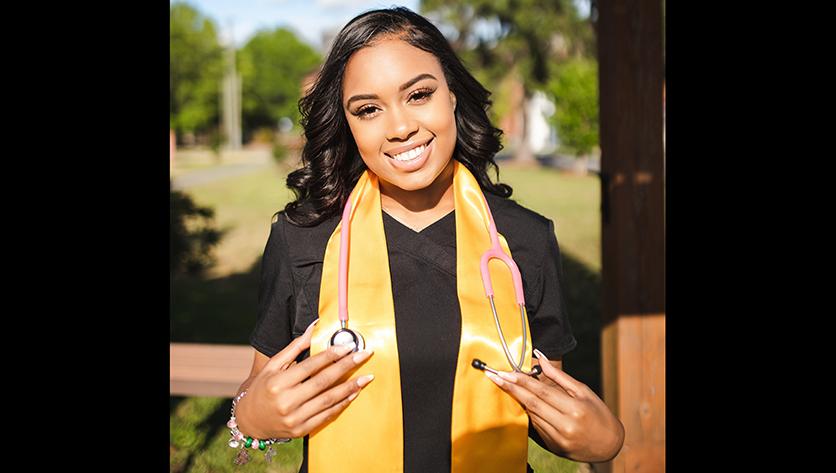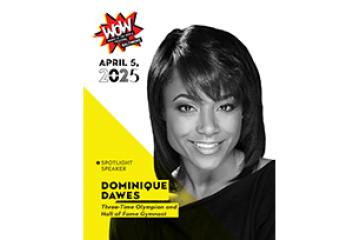ABSN Graduate Spotlight: Kaya Stokes

By: Erik Pedersen, Content Strategy Director
BALTIMORE – Kaya Stokes is set to join Mercy Medical Center as an ICU nurse after graduating from Notre Dame of Maryland University with the rest of her Accelerated 2nd Degree Bachelor of Science in Nursing (ABSN) cohort this May.
Her desire to work in healthcare began early on, and it only grew stronger in high school after a concussion sustained during a basketball game led to the discovery of a pituitary adenoma tumor in her brain. Stokes had already overcome other health obstacles as a child. After working with so many medical professionals over the years, she wanted to be able to provide the same kind of support to future patients.
Stokes had initially planned to enroll in medical school following her 2022 graduation from South Carolina State, where she majored in biology with a concentration in oncology. After returning home to Baltimore, however, an alumna of Notre Dame’s ABSN program helped encourage her to consider nursing as an alternative.
Learn more about Stokes’ journey below, as she discusses her medical history, her path to nursing, and her experience in NDMU’s ABSN program:
What led to your initial desire to work in healthcare?
It was definitely based off my health history. I was born early. I was just over three pounds at birth, and I had SVT (Neonatal supraventricular tachycardia). I was on a heart monitor for around a year. My entire family had to help with all the medication that I had to take as a kid. I also had really bad asthma throughout my childhood.
I played basketball as well, and I hit my head during a game when I was 15 on the varsity team at Baltimore Poly. The lights were bothering me during my next day in school, and after telling my family they took me to the hospital. While I was there, they discovered a mass on my brain. Instantly I started crying – I was thinking the worst.
Luckily, they tested everything and it wasn’t cancerous or anything like that, but I was just battling to get through school. I was extremely tired. I would get sleepy out of nowhere. I had to see a cardiologist at one point because it felt like my heart was stopping. I saw neurosurgeons, cardiologists, endocrinologists – they were running so many tests. We just didn’t know what it was, but I understand now that it was all connected by the tumor. I eventually had a surgery where they made the tumor fall back a little bit.
How are you feeling in the present day? Are you still impacted by this condition?
It’s more controlled now than it used to be. Here and there, I might have some instances where I feel like my heart may stop, particularly when I exercise, but it’s not as worrisome to me now. I’m able to just gather myself and move on. I’ve learned to live with it.
Did your experience interacting with nurses during all of your medical visits over the years help drive you to the profession?
Definitely. I’ve met so many wonderful nurses. As I’ve gone through nursing school, it’s been so fulfilling for me to care for people, to help them feel better, and to help push them through their journey, especially because I’ve been there as a patient. A lot of people don’t know what it’s like to be in the ICU, or to be in a very dark place where they’re unsure about their health and what the next day will be like for them. I can connect with my patients on that level when I care for them. I try to tell them that I understand, I’ve been there, and I’m going to be here to help.
How did you first hear about NDMU, and what inspired you to enroll in our ABSN program?
I have a friend, her name is Maya Harris, and she was a member of the program’s fourth graduating cohort. She’s like a big sister to me. She’s an ICU nurse as well, and she had also planned to go to medical school before switching to nursing. I talked to her about her experience, and she encouraged me to apply. She thought I would love it. Going through the application process, it just felt like home. Notre Dame was willing to work with me for anything I needed.
What has your experience been like at Notre Dame?
I’ve met some of the greatest friends that I’ve ever had in nursing school, and my instructors are amazing. They have different personalities, but they all help us in different ways. They definitely push us. They tell us that we’re meant to be here, and I really appreciate that. I feel like nursing has helped me find my purpose.
Were any faculty members particularly influential during your time here?
Shana Skeffrey. She was my MedSurg (Medical-Surgical) clinical instructor. I was going through so much throughout nursing school, just dealing with personal life issues, and I remember one day during those difficult times I was walking to my car after clinical. I was there and present with my patients, but I knew that Shana could tell I was going through a lot.
She stopped me and just said, ‘You are really great at what you do, and you’re going to be amazing. I just need you to keep pushing. Don’t let anybody stop you or deter you from anything that you want to achieve.’ From that point forward, I’ve had such a changed mindset. I’ve surrounded myself with positive energy and people who have helped push me to excel. It’s helped get me through nursing school, and I’m really grateful to Shana for being a big part of that.
What classes in the program were most impactful for you?
The classes that taught me the most in terms of nursing skills were 311 (Professional Nursing Care of the Adult I) and 409 (Professional Nursing Care of the Adult II). I really appreciated both of those instructors, especially in a hybrid program where you don’t always have that face-to-face interaction. Professor Lyndsay Wright and Dr. Katelyn Quarry, both of them are amazing instructors. They teach you so much, and they help you understand what you really need to know when you’re taking care of critical patients.
I was midway through nursing school when I took 311, and I felt like that was the time when nursing started clicking for me. All of the dots came together where I really understood what was going on with my patients, what was going on with their bodies, why I needed to give certain medications, what medications can’t go together, all those kinds of things.
Pathopharmacology was also memorable. It was the toughest class that I’ve had in my life, but I feel like it will always apply to any nursing course that you take because of the knowledge you gain about medications. Those are the three classes that have shaped my skills that I will definitely take with me going forward into nursing.
Established in 1895, Notre Dame of Maryland University (NDMU) is a private, Catholic institution in Baltimore, Maryland, with the mission to educate leaders to transform the world. Notre Dame has been named one of the best "Regional Universities North" by U.S. News & World Report.




